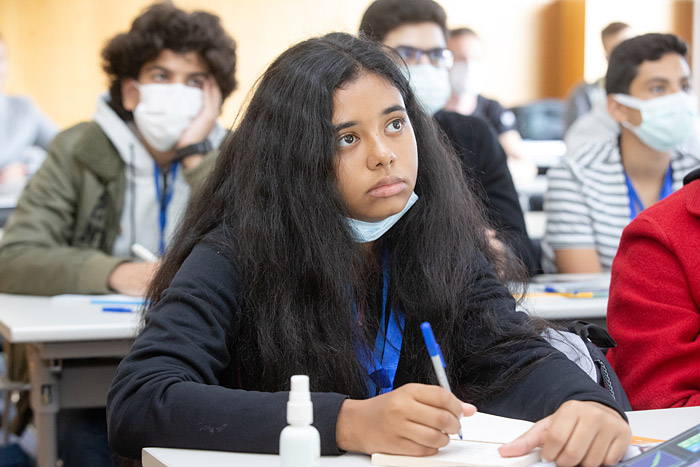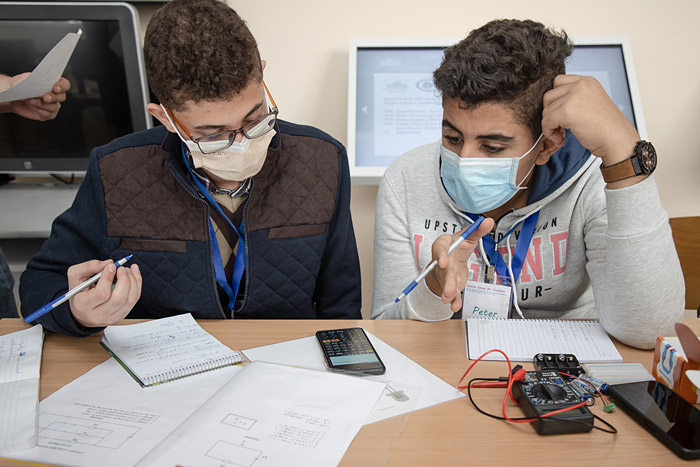“Everything turned out to be much more interesting!”
News, 30 September 2021
From 6 to 11 September, JINR held the Science School for Students of the School University of the Egyptian Academy of Scientific Research and Technology (ASRT). 14 school students aged 13-16 learned about research and the basic facilities of the Institute, visited the Superheavy Element Factory and the Nanocentre at FLNR, got acquainted with the NICA project at the VBLHEP site, and visited LRB.
The programme of each day had three hours of practical classes for school children to master the basics of electrical engineering and electronics. The social part of the programme included acquaintance with the Institute’s part of Dubna, a trip to Moscow, and a concert in the Children’s Music School.
“The programme of the School University was launched in Egypt. It cooperates with 40 various universities of the country,” head of the group, Deputy Head of the ASRT School University Rana Hosny Elsayed Refaey said. “They provide an opportunity for school students to use their equipment and teach young people various disciplines that are not taught at schools. Our goal is to interest young people in physics, as far as there are few such people in Egypt. We offered children a programme that they mastered online. The programme includes interactive events, sessions, etc. After that 200 people from all over Egypt decided to join the programme.
Then we conducted two types of exams: critical thinking and solving non-standard tasks, and an oral exam at which we were evaluating communication skills. About 45 people out of 200 were selected. Only 14 students came to JINR. Our main task is to increase the education level in physics. We also want to interest young people in physics and allow them to see more opportunities for using their knowledge and learn much about such centres as JINR.
Only two days passed since our arrival, but the children already say that they like it here, they learn a lot, some students are interested in building a career at JINR. Some of them want to write a dissertation on the Institute’s basis. That was exactly our task, and we have achieved it.”
“What has impressed you the most?”
“My specialisation is chemistry, and my research field is beyond physics. However, I may say that everything is organized well here: the Institute is building far-reaching plans covering decades. Complementing the Periodic Table with new elements, the high-level research organization, and a general passion for science.”
“How much are the students interested in nuclear physics?”
“The children are engaged in it, they ask numerous questions. The students are very inquisitive, they constantly speak about physics in buses, in the evening, ask questions, and they are really happy to get such an experience.”
“Are there similar programmes in other countries?”
“It is our first experience of such a format, but we would like to hold this programme annually if JINR supports this intention.”
Abdelrahman Waleed Mohammed Ismail said, “I was thinking of the School as something boring and imagined getting information from scientists attending lectures. But everything turned out to be much more interesting: we learned not only theoretical aspects but we were also told about the practical use of scientific knowledge. We have seen real experimental facilities. It turned out to be much better than I have expected.
I like the concept of Dubna, a city with a scientific infrastructure inspiring people to learn new things and to do science. They have no time to talk about personal issues. They discuss science, and I like it. This is a quiet city surrounded by forests. I also really like it. I am keen on particle physics and nuclear physics. And this is a fascinating field for research.”
Hagar Osama Talaat Mohamed Elnemr commented on the School, “First of all, I was lucky to get such an opportunity at this age to be here, at the Joint Institute for Nuclear Research, surrounded by so many geniuses, to see accelerators, to learn how they study the atom, nuclear reactions. This is amazing. I was expecting something extraordinary from the School. Something that would help me decide on what I like the most, in what fields I should develop. It gives me an opportunity to make sure once again what life path to choose, to understand my goals. It is wonderful to be here.”

Fares Elkenawy said, “I study at a school with a linguistic bias and at the School University where we do an extended course in mathematics, natural sciences. Moreover, we conduct research at our University, visit other universities of Egypt.”
“Are you going to link your future with science?”
“Yes, I like science. I like physics, mathematics, chemistry – basic science. And I would like to link my future with something connected with it. It will possibly be medicine, biophysics, or engineering. But it will definitely be connected with science.”
“Can this visit to JINR influence the choice of your future career? Has anything impressed you at JINR?”
“In fact, it is my first experience of travelling abroad. We were so impressed by everything we saw at JINR, by its research, elementary particles studied here, by the way new elements are produced. We liked that we met people working here at the facilities, and not only with leading specialists but also with engineers and ordinary researchers. I was struck by Moscow, its architecture, culture. I have marvellous impressions from the trip. The visit to JINR, a world-known centre, will definitely improve my CV. It will be a bright note that will help enter a university.”

A UC supervisor for work with teachers and students E. G. Karpova said, “A one-week programme included visits to all the Institute’s laboratories. It started with the exhibition in the Cultural Centre “Mir” dedicated to the JINR basic facilities. Students were deeply impressed, it was a memorable beginning. The opening ceremony of the School also was held there. School students had everyday practical lessons at which they assembled electrical circuits, used multimeters, electronic components. Such lessons took half a day. We consider it a significant part of the programme. The preparedness level of students was different due to different ages. They passed strict, many-stage selection in Egypt. There were about 200 applications for the competition for this trip. Only the best students got this chance. The programme should have taken place last year but well-known limitations changed everything.”
“Is it a one-time event or is it planned to make it regular?”
“It is hard to predict something now, but supervisors who have come with children have expressed their hope that this event will be regular. We used to have regular international student practices for students from Egypt right in autumn. However, children like the weather. It is +30 degrees in Egypt and they have rest from the heat here. We have instructed them in advance to bring warm jackets, umbrellas and comfortable shoes, so they were ready.
On my own behalf, I would like to note that children make a very pleasant impression. How they interact with supervisors! They do not passively stay and listen but ask numerous questions, as it was today at VBLHEP. This topic is exceptionally close to them, apparently, it all sounds familiar to them: high-energy physics, the Big Bang Theory, the discovery of the Higgs boson. Everyone listened with interest about the synthesis of new elements. This discussion also prompted numerous questions. That is why we do not always strictly follow the programme. It is necessary to adjust it on the go, and of course, a one-week visit is not enough to learn about JINR. All guides, lecturers concluded their speeches with the same words: we introduced you to the topic, and then everything is in your hands, you can come here as students for practice and work.”
Olga Tarantina,
translated by Elena Karpova,
photos by Igor Lapenko